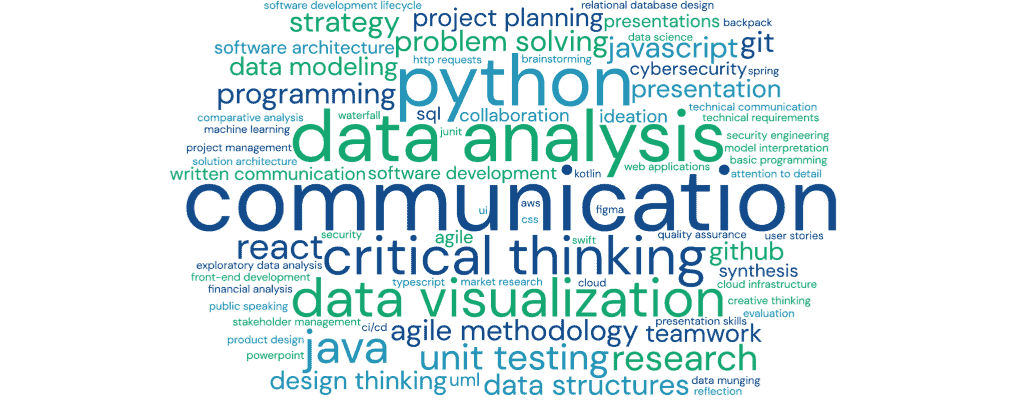Nearly one in five U.S. job postings in 2023 doesn’t require a degree, up from 15% in 2021, according to LinkedIn. As an increasing number of employers shift to skills-based hiring, job seekers in the tech industry need to understand which skills employers consider the most essential skills for a job.
Forage’s free job simulations are one way to learn new skills — especially the skills most important to companies that are hiring now. Employers use job simulations on Forage to showcase the types of skills their employees use on the job, and Forage users who complete the simulations get a chance to demonstrate those skills.
For this article, we examined which skills Forage tech job simulations most commonly cover. We looked across all tech job simulations and within groups of job simulations specific to particular roles.
>>MORE: Discover the right career for you based on your skills with a career aptitude test.
The Top Skills Taught in Forage Tech Job Simulations
Most of the skills Forage tech job simulations commonly cover are hard skills. Data-related skills, programming languages, and collaborative skills like version control and agile methodology make up many of the 25 most common skills.
However, the most common skill overall covered by tech job simulations on Forage is communication. Fifteen of 61 tech industry programs (25%) teach this skill in at least one task. It’s also the most common skill taught across all of Forage’s nearly 300 programs. Twenty-nine percent of Forage programs cover communication skills in one or more tasks.
According to LinkedIn, communication is the No. 2 most in-demand skill across all jobs in 2023.
“[Companies] don’t just want candidates that can code and do the technical work, they want candidates that can work cross-functionally and have good communication skills to be able to effectively present the work they’ve done,” says Garrett Chappell, program manager at Forage.
Aimee Young, program strategist at Forage, seconds the importance of being able to work cross-functionally. “A fair amount of our technology programs have a person applying their technological skills across different teams in the organization,” she says.
There is one other soft skill in the top five skills taught in Forage tech job simulations: critical thinking. Nine of 61 tech job simulations on our platform highlight critical thinking (15%), along with 28% of all Forage programs.
Critical thinking involves making judgments by evaluating multiple sources of information. You might employ analytical thinking, the process of discerning patterns in information, to conduct those evaluations. In the World Economic Forum Future of Jobs Survey, employers consider analytical thinking to be the top core skill for their workforces in 2023.
“When evaluating early talent with limited professional experience, I prioritize candidates who exhibit key traits such as adaptability, effective communication, and critical thinking, alongside a genuine desire to learn,” says Stephanie Loewenstern, founder of Bright Link Talent.
She also emphasizes that candidates must have the basic technical skills required for the role.
There is considerable overlap between the most common skills taught in Forage tech job simulations and LinkedIn’s list of the most in-demand hard skills. For example, Python, Java, data analysis, JavaScript, and general programming or software development all appear in both.
The Most Important Skills for a Job in Software Engineering
Most of the skills software engineering job simulations on Forage cover are technical skills like programming languages. For example, across 23 Forage software engineering programs, Java, Python, JavaScript, SQL, CSS, Swift, and TypeScript each appear in tasks in at least two simulations. Java, featured in eight Forage programs, is especially common.
This set of languages is aligned with Stack Overflow’s 2023 Developer Survey. The survey found that the most popular technologies for developers to use are JavaScript, HTML/CSS, Python, SQL, and TypeScript.
Similarly, Forage programs cover several programming frameworks, such as Spring and React. React is the second-most common web framework developers are using in 2023, according to Stack Overflow.
Forage’s software engineering job simulations also cover soft skills, like communication and collaboration skills.
“While specific languages used in software engineering such as Java, C#, React, et cetera are very much in high demand, I would say communication skills are probably the most important skills we look for,” says Wendi Reuter, a senior IT recruiter at Carex Consulting Group.
“Software engineers that can work as part of a team and be able to explain the projects they worked on, what tech was used and, more importantly, how it was used, and the results of the project are what hiring managers are looking for,” she says.
Reuter adds that experience with cloud providers, API integration and development, CI/CD, and data pipelines are also in high demand.
Interestingly, the most important skills for a job in software engineering are not static. According to LinkedIn’s Future of Skills tool, React, TypeScript, git, and Python were all top skills for software engineers in 2022. Those same skills were not top skills in 2015.
Tools and technologies are always changing. Because of this, it’s especially important for software engineering candidates to have a strong grasp of fundamental programming concepts that are not language-specific.
Forage software engineering job simulations also cover language-agnostic principles of software development. These principles include unit testing, data structures, software architecture, and CI/CD.
For example, Hewlett Packard Enterprise’s Software Engineering job simulation includes a task that requires building a RESTful Web Service with Java, a proposal task that teaches communication, and a final task that teaches unit testing.
The Top Skills Taught in Data Science and Data Analytics Job Simulations
The most common skill covered across data analytics and data science Forage job simulations is data visualization. Seven of nine data-related programs (78%) teach this skill. Data analysis is a close second, featured in six programs (67%).
Python is the only programming language commonly covered in data science and data analytics job simulations on Forage. In contrast to software engineering programs, data science and data analytics programs on Forage emphasize statistical skills. These skills include data modeling, machine learning, and model interpretation. In addition, communication and presentation skills are prominent soft skills in these programs.
“The main technical skills/languages that we see companies wanting are Python, SQL, and R,” says Karl Cremin, the co-founder and director of Talentspot Recruitment, which primarily recruits for data and cloud-related roles.
“Python is the most sought-after, and you can set yourself apart from other candidates by having some exposure to it,” Cremin says. While demonstrated experience from an internship is ideal, Cremin recommends that candidates without on-the-job experience take online courses to further their skills.
Cremin also emphasizes the importance of soft skills in data-related roles. “Data roles nowadays require stakeholder engagement and, sometimes, stakeholder management. So showing that skill can be equally or more important than tech skills because, arguably, if someone is technically minded, they will pick up the tech stack quickly,” he says.
I’ve interviewed candidates for data science positions in the past. I considered data analysis, machine learning, and programming skills to be the most important technical skills for data science jobs. However, data science positions tend to require a hodgepodge of skills. The skills required can vary widely depending on the company and the scope of the role. Collaboration, an experimentation mindset, and healthy skepticism are also vital.
Like software engineering, the data science and data analytics fields are constantly changing. Data visualization and Python were both top skills for data analysts in 2022. However, they were not top skills for the role in 2015, according to LinkedIn. Both of these timely skills feature prominently in data science and data analytics job simulations on Forage.
BCG’s data science and analytics job simulation follows a typical workflow that you might encounter in a data science role. The tasks include understanding business needs, doing exploratory data analysis, building a model, and interpreting that model.
The Most Important Skills for a Job in Cybersecurity
There’s some overlap in the skills that data-related programs on Forage teach and the skills cybersecurity programs teach. Specifically, data analysis and Python are among the most common skills that cybersecurity job simulations cover.
Cybersecurity job simulations on Forage also teach skills more specialized for cybersecurity roles. These include root cause analysis, risk assessment, and access control.
For example, JPMorgan’s Cybersecurity job simulation requires analyzing data and building a classification model for emails. Both of these are tasks that could appear in a data science program. This program also includes a task that emphasizes access control, a concept more specific to cybersecurity.

JPMorgan Cybersecurity
In this free job simulation, you'll discover what it's like to work on a cybersecurity team by analyzing a fraud data set and building an email classifier.
Avg. Time: 5 hours
Skills you’ll build: Data analysis, machine learning, access control, email security fundamentals
How to Highlight Your Skills in Your Job Search
Seeking out opportunities to learn new skills is important, but so is conveying your mastery of those skills during the job search process.
First, focus on the skills you do have when you apply for a job. Don’t focus on the skills you don’t possess that you believe the company wants to see.
“The best thing early talent can focus on is understanding more about themselves, what makes them tick, and what they bring to an organization,” Cremin says. “Too often, early talent will focus on what a company wants and how they can fit that, the square peg in a round hole scenario, appealing to and trying to sell skills or traits they might not possess.”
Cremin gives the example of an introverted person applying to solution architecture roles. These roles are client-facing and require superb communication skills. This person shouldn’t overcompensate for their perceived lack of people skills by overselling their communication abilities in the interview process. Instead, they should focus on their strengths in other areas that they would bring to the role.
Second, be prepared to explain how you demonstrated or improved your skills in past experiences.
“Candidates can best exhibit their skills during the recruitment process by effectively communicating past experiences where they adapted to new situations, solved problems, and showed eagerness to learn,” says Loewenstern.
Third, prioritize learning, both while you’re still in school and once you’ve graduated.
“To boost their chances of being hired, candidates should focus on continued learning through courses, workshops, and internships. This not only broadens their knowledge but also enriches their portfolio,” says Loewenstern.
Ready to build your skills to land a position in tech? Sign up for Forage and browse our catalog of hundreds of free job simulations.










